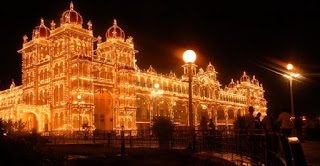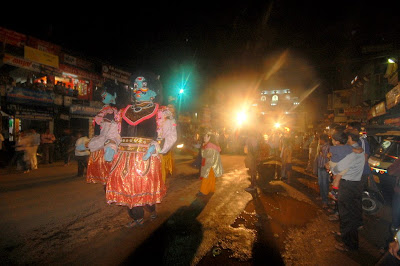EWB-UK - SELCO Placement - India
About this Blog
Sunday 19 September 2010
Thank You
I would like to thank everyone who has been a part of making my placement such an enjoyable and interesting experience: the whole placements team at EWB, Anand Narayan - lab manager at SELCO, Sam Cocks, Joyce and Jitendra - my fellow SELCO interns, my family, and of course everyone I've met at the SDM college hostel in Ujire.
Last days in India :(
I thought I'd finish this blog and my last post with several top lists:
Top 5 best experiences:
Home-stay visit in rural farmhouse
Having a guide to take us around Mysore (including the Centre for renewable energy and sustainable technologies)
Masala Dosa, Ice Cream & Gobi Manchurian
Meeting and sharing experiences with everyone in the engineering college hostel
Transporting testing the solar biomass hybrid dryer.
Houseboat tour of the Keralan Backwaters
Top 5 worst experiences:
6 hour bumpy overnight bus journey from Dharmastala to Mysore (10.30 – 04.30)
The day of a strike in Trivandrum
Walking half an hour back in the rain having forgot my Umbrella.
Loosing my appetite for Indian Food when not feeling well
Chundering everywhere
My top initial annoyances for westerners traveling to India:
Understanding the Indian head wobble
A huge number of junk calls and text messages on Indian mobile phones
The possibility chance that every rickshaw driver might overcharge you.
Lack of pavements on most roads, combined with the crazy traffic behaviour.
Top questions asked to me:
How do you find this place?
How do you find the food?
What are you doing here?
My list of top 5 things India is good at:
Sustainable food production and agriculture
Hospitality
Cheap newspapers
A workforce who are skilled enough to carry out repairs
Religious Culture
Maintaining a high population
Governmental corruption
NB. I've definitely missed / forgotten many things from these lists.
Thursday 16 September 2010

Last weekend saw the Ganesh Chaturthi festival, and in every town we passed through, huge processions and groups of people filled the roads. (blocking them) In Ujire, there were fireworks and a party atmosphere. It was certainly a strange sight to see hundreds of people 'dancing' to Indian music in the street.
Wednesday 8 September 2010
Training It
I haven't blogged in over a week, so this post is longer than I usually bother to write - I've got the time as I'm writing this on a thirteen hour train journey.
Last week, after ironing out any glitches with the current dryer design, I ordered the construction of two solar biomass hybrid dryers. This was much easier than it had been previously as I did not have to explain the designs. On worker commented 'making one prototype is difficult, but making more is much easier. The purpose of these two dryer is to package them and send them to demonstrate drying at SELCO's regional branches.
The last four days I have taken off work to visit the backwaters of Kerala, and was an experience to remember. Out of the eight different train classes, I decided to travel in what I thought was complete comfort on the way, 2 tier AC. I was given a blanket and a pillow, and spent most of the journey trying to stop the freezing cold AC vent blowing in my face.
It occurred to me as I was being driven round the backwaters on a houseboat, how vulnerable the people living there actually were.
What is development? When should it stop?
Is an equal world desirable?
Is the world overpopulated?
These questions arose in my mind because you see so many people living what appear to be very happy lives among the backwaters. For me the answers to these questions come down to vulnerability and sustainability.
I am now heading back to work. My train (non AC this time has just entered Karnataka - I know this because after 4 days in sunny Kerala, it has just started to rain.
Development problems, like the drying problems I have been faced with are difficult problems to solve. As my placement nears its end, I realise what huge achievements and progress I have made, but have to face the reality that unless SELCO sells any of the products developed in the lab, the impact will be minimal.
I hope the product demonstrations are a success, but know that whatever the outcome the lessons learned will make it have an impact on peoples lives in the future.
Written on the 6604 Mavali Express from Trivandrum to Mangalore.
As a side note, last week, having watched the sun set over the tropical treetops, I was lying on my bed in a etherical haze, and I knew where I was... in India.
But then I just chundered everywhere!!!
(Actually I must have eaten something my body didn't agree with)
Monday 30 August 2010
Scrumptious Dried Bananas
At last! Smoke-free dried bananas, dried using biomass as a fuel. It took just under 30 hours to dry the bananas using 10 kilograms of wood. As this was an experiment, I recorded the weight of the bananas as they dried to determine the drying rate of the bananas.
Testing – It was great to here that many people liked the bananas, especially their colour and sweetness. When asking a couple of students at the hostel if they liked the bananas, they gave a response which even after 8 weeks, I find very confusing – the Indian head wobble!

The next steps of this project are to test the dryer at various sites around Karnataka.
Over the weekend myself, Sam and some of the students rented a Jeep to take up to Charmaddi, stopping off at various viewpoints and waterfalls along the way. On Sunday we had a relaxing day at the beach – and it didn't rain.
Tuesday 24 August 2010
Mysore
 Charmundi Hill & Temple
Charmundi Hill & Temple The Market
The Market

Train Journey back to Ujire
 The Railway Museum
The Railway Museum Mysore Zoo
Mysore Zoo

Thursday 19 August 2010
Failure
This week I have developed a cheap, sixteen brick rocket stove which can be used in combination with the dryer, giving good combustion once lit and good temperatures.
This however was the only success. The metalwork in the dryer restricts the flow of smoke through the dryer, causing the food to become smokey, a problem which I have been as yet unable to get around. It is difficult to get good heat exchange, good air flow and a simple design.
I visited a steel workshop today, searching for alternative materials for the dryer. It was amazing to see the complete lack of health and safety procedures, with people arc welding in flip flops and without a face mask... but nobody was hurt while I was there.
Good luck to anyone in the UK who will collect their A-level results tomorrow!



